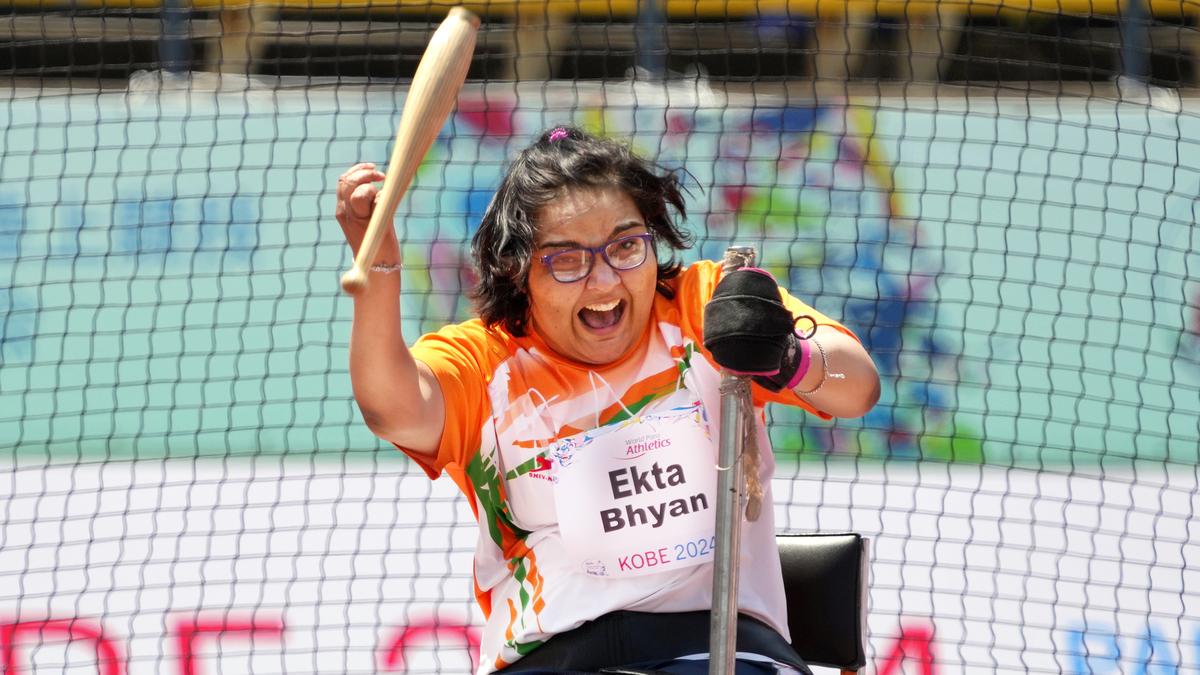Ekta Bhyan: Sport matters because it allows us to be visible in a country where public spaces remain largely inaccessible
Everyone has their own motivation for performing at the Para Athletics World Championships in New Delhi.
For me, one reason is deeply personal: it’s my first chance to compete at a World Championships in India. I’ve already been to four editions abroad, but this one feels different.
It’s one thing to do well overseas and another to do well at home, with family and friends cheering — in Hindi, no less!
But my journey to this stage didn’t begin with sport.
I was paralysed in a car accident at 18. After the injury, my first priority was academics. I wanted financial independence. In 2014, I cleared the Haryana State civil services exam, a turning point in my life. It challenged many perceptions — I proved that women with disabilities could be independent, earn a living, and support themselves.
That was when Amit Saroha, one of the pioneers of para sport in India, noticed me through a newspaper interview. He introduced me to athletics. At first, I doubted myself, but my parents convinced me to give it a try. Their reasoning was simple: I already had a job, so there was nothing to lose. Sport could at least help me focus on my health. Once I began winning medals, there was no looking back.
Para sport isn’t just competition, it’s Bhyan’s way of living with strength and purpose.
| Photo Credit:
R RAGU
Para sport isn’t just competition, it’s Bhyan’s way of living with strength and purpose.
| Photo Credit:
R RAGU
I enjoy winning, of course, but more than that, I love the training and the chance to be outdoors. For most persons with disabilities in India, public spaces remain inaccessible. Often, we are confined to our homes. Sport gives us a rare opportunity to step outside, breathe fresh air, and be visible in a society that too often hides us away. That’s why the accessibility upgrades at the Jawaharlal Nehru Stadium matter so much, even if there is still a long way to go.
My first big stage was the Tokyo Paralympics, though I couldn’t perform to my potential there. I looked forward to Paris 2024, but my event, the F51 Women’s Club Throw, was dropped from the programme in 2022. That was disappointing. Still, sport teaches you to reset. I reminded myself that every competition matters, whether it’s the Asian Games or the World Championships. My category will return at the Los Angeles Paralympics in 2028, and I’m determined to win a medal there.
Over the past four years, I’ve stayed consistent: gold medals at the National Championships, a bronze at the Asian Para Games, and medals at the World Championships, including gold and bronze in Paris in 2023. This season, I won gold at the Indian Open Paralympic Championships and followed up with silver at the India Open.
Now, in Delhi, I have a number in my mind — one I keep visualising every time I train. My personal best is 21.5m, and I’m intent on improving that. For three years, I haven’t missed a single day of training. Mornings are for the gym, evenings for outdoor practice, carefully scheduled because thermoregulation is a big challenge after a spinal injury. With only 40 per cent lung capacity and limited use of my muscles, every session requires careful management. My shoulders are my strongest asset; my biceps are okay but my triceps, forearms and wrists are very weak, and my fingers have no strength at all. But I work with what I have.
It hasn’t been easy. I always need two people to help me with daily routines — transferring from wheelchair to car, reaching the ground, managing travel. Public transport is out of the question, and a car has to accommodate me, my wheelchair, and my assistants. That means bearing the expense of three people, not one.
The harder struggle, though, is mindsets. People with disabilities are still not seen as part of the mainstream.
Accessibility remains the biggest barrier to education, work, and independence. When we travel overseas, public spaces and transport are usually wheelchair accessible.
That’s not the case in India. I can’t imagine myself travelling by bus or train. Because of this lack of accessibility, people with disabilities are denied opportunities to be independent — to continue their education, find employment, or pursue sport. It remains one of the biggest barriers we face.
That is why visibility in sport is so powerful. After Rio, Tokyo, and Paris, I’ve seen how Paralympic sport is gaining recognition.
The World Championships in Delhi will be another step forward; not just for me, but for thousands of para athletes who will finally be celebrated for their effort.
I am, of course, aiming for a medal. But more than that, I am looking forward to a celebration of inclusion.
As told to Jonathan Selvaraj
Published on Sep 25, 2025



